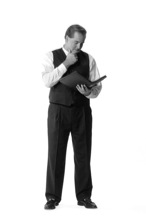
The Biofeedack Institute’s
Training Programs:
Training Programs:
-
 National Certification Training Program
National Certification Training Program -
 Introduction to Clinical Biofeeedback/Neurofeedback
Introduction to Clinical Biofeeedback/Neurofeedback
Introduction to Clinical
Biofeeedback/Neurofeedback:
Biofeeedback/Neurofeedback:
A Three Day Program
This course introduces health care professionals to clinical work in biofeedback. It covers the physiology, instrumentation, major applications, and clinical protocols as well as the recent developments and treatments in EEG Neurofeedback. The goal of further coursework is to develop a minimum competence in biofeedback and behavioral medicine. In addition to lecture, participants get hands-on experience in operating the equipment and applying the protocols to clinical treatment. Supervision, case studies and peer training is also available to follow guidelines of the Biofeedback Certification Institute of America.
DAY ONE - Basic Biofeedback
Overview of Biofeedback - History, Definitions, Concepts and Principles
Neurophysiology - central and peripheral nervous system structures and functions
Biofeedback Instrumentation - electronic terms and concepts
Electromyograph (EMG) Biofeedback - physiology and instrumentation
Temperature (Thermal) Biofeedback - physiology and instrumentation
Electrodermal (EDG) Biofeedback - physiology and instrumentation
Electroencephalographic (EEG) Biofeedback - physiology and instrumentation
Heart Rate, Blood Pressure, Blood Volume Pulse Biofeedback
Respiratory Biofeedback - physiology and instrumentation, Asthma
DAY TWO - Clinical Applications
The Psychophysiology of Distress - concepts, symptoms, etiologies, interventions
Treatment of Anxiety, Phobias, Panic and Fear, Type A Behavior
Neuromuscular Reeducation - clinical methods and procedures
Migraine and Tension Headache - physiology, assessment, interventions
Vascular Disorders - Hypertension, Raynaud's Disease, and Cardiovascular
Special Applications - Bruxism, Incontinence, Sexual Dysfunction, Gastrointestinal Disorders, Stuttering, Blushing, Repetitive Strain Injury
DAY THREE - EEG Neurofeedback
History of EEG, early biofeedback and current neurofeedback
Psychophysiology of the EEG and brain mapping
Neurofeedback Instrumentation and electronic definitions
Brain Applications - Attention Deficit/Hyperactivity Disorder, Alcohol/Substance Abuse, Mild Closed Head Injuries, Epilepsy, Insomnia, Depression, Creativity
Clinical Protocols - assessment, set up, electrode placement, sessions, adjunctive methods and devices, beta training for ADD/ADHD, Head injuries, alpha/theta training for Alcoholism, PTSD Personal Experience and Hands on practicum
Additional Topics as time permits: Treatment Planning, Troubleshooting problems, Adjunctive Techniques (Relaxation, Autogenic Training, Open Focus, etc.), Cognitive Interventions, Professional Conduct, Efficacy, Multimodal Computer based Applications, Data reports, setting up a Clinic or Practice, the Future of Behavioral Medicine and Applied Psychophysiology, Certification and Professional Societies, Resources and References, Sports Medicine, Peak Performance, Ergonics, Personal Growth, Integration and Psychotherapy, Case Conference, International Interest in the Field.
REFERENCES
Fuller von Bozzay, Methods and Procedures in Clinical Practice, 1980
Fuller von Bozzay, Biofeedback, Stress Management, and Behavioral Medicine, 1990
Fuller von Bozzay, Projects in Biofeedback: A Text-Workbook, 1989
Basmajian, Biofeedback: Principles and Practice for Clinicians, 1989
Schwartz, Biofeedback: A Practitioner's Guide, 1987, 1995
Fried, The Psychology and Physiology of Breathing, 1993
Hatch, Biofeedback: Studies in Clinical Efficacy, 1987
Carlson, Clinical Applied Psychophysiology, 1994
COST $395- a non-refundable $75- deposit is required one week before the workshop.
You may take any one day of the program for $150- (for example the EEG Neurofeedback only) A workbook and certification of completion will be given to attendees.
NATIONAL CERTIFICATION TRAINING PROGRAM
The remainder of the hours required for certification meeting the BCIA Certification requirements may be obtained through our joint program in Seattle (API Bainbridge Is. Wash.). The cost is $1450. Personal Training (10 hours), Clinical Experience (10 hours), and Supervision/Case Conference (5 hours) may be obtained by arrangement at a cost of $600.
A complete Supervised Clinical Experience in which 6 patients are provided, with supervision and case conferencing, over a 10 week period as required by the BCIA can be done in two afternoons per week at a cost of 1450.
Following the completion of the didactic and clinical experience hours one can apply for and take the written and practicum examinations given twice a year (March and November) for National Certification in Biofeedback. In any case, a certificate of completion is given for all coursework and supervision.
TO APPLY:
Send name, addresses, phones, affiliation and/or background and previous training, and goals in taking the training. Include a resume/vita if available and a $75 deposit.




The Biofeedback Institute’s Training






